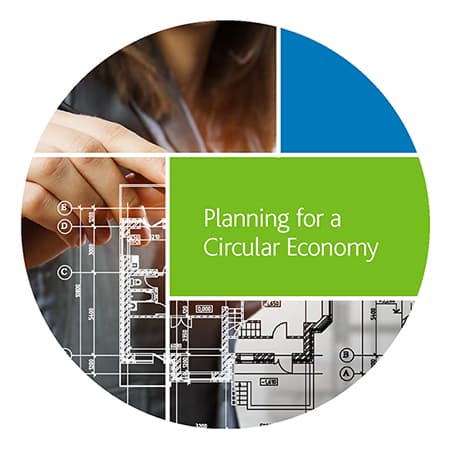Planning authorities in the UK need to change the way they treat the waste and recycling sector if circular economy objectives are to be met, the Environmental Services Association said today.

The report takes a detailed look at the planning system and its relationship with waste and recycling facilities
The call for change comes in a report, Planning for a Circular Economy, published today (11 April) by the ESA which represents companies in the UK waste management industry. It highlights key aspects of the planning regime which the study says can often frustrate industry’s efforts towards achieving a resource efficient economy.
Councillors are accused by the association of often overruling officer recommendations and of living in the past world of landfill rather than seeing waste management facilities as part of “mainstream industrial processes”. However, the ESA does note that there are some signs of improvement in understanding of and permissions for waste facilities.
The ESA also made calls for specific planning actions such as on catchment boundaries and planning support for schemes which use the heat generated by energy from waste plants.
Circular
Calling for a “more responsive planning system” the ESA reasons that this will help grasp the opportunities presented by a Circular Economy.

The ESA points out that RDF exports are losing the UK £280 million annually
And, the Association highlights the £280 million annual loss of material to Europe as refuse derived fuel. It notes: “While the export of recyclable material generates over £1bn in sales for the UK, increasing domestic waste treatment capacity would result in further economic benefit as the export of refuse derived fuel (RDF) to Europe is estimated to be costing our economy £280m a year, with the economic and environmental benefits of recovering this material being realised overseas.”
Dynamic
ESA’s policy advisor, Stephen Freeland said: “Many local authorities need to let go of the strict control culture that has prevailed in one form or another since the “landfill era” and instead adopt a more responsive approach to planning for waste management which better recognises the variable and dynamic nature of the space in which our industry now operates. Our industry increasingly resembles that of any other logistics business with materials moved around as markets dictate.”
“Few other sectors face the same planning and political obsession”
Stephen Freeland
Environmental Services Association
Mr Freeland added: “Few other sectors face the same planning and political obsession about the origin of material or commodities, and where these should be transported to. To hamstring the resource and waste management industry in such a way will likely hamper investment and progress towards the objectives of the Circular Economy”.
Catchment
The report comments that a number of councils have imposed limits on from how far waste can come from to new facilities. The ESA takes a strong stance on this accusing some councils of being anti-competitive in an approach where in interpreting net self-sufficiency, some planning authorities have sought to impose mileage limits on the haulage of waste to and from waste and recycling facilities (i.e. imposing catchments) either within local plan policies or through planning conditions on consented development.
The report states: “Imposing catchments on new waste facilities restricts the market available to that facility while existing facilities (within the local authority area and in adjoining areas) would be able to compete in these restricted areas. It is inevitable that new facilities would be at a competitive disadvantage to those facilities which did not have restricted catchments. Facilities with restricted catchments would be deemed a higher risk for investors which ultimately could prevent the delivery of modern waste infrastructure.”
And, the association claims that there is a growing body of evidence from Planning Inspectorate casework and elsewhere which confirms that catchment boundary restrictions are neither justified nor supported by national planning policy.
Heat
By including a heat map for planning applications and considering the potential use of heat from new facilities, energy from waste plants could be better utilised, it is argued. This is in the face of a planning disconnect and the fact that facilities have had often to be sited away from potential users of heat.
Related links
ESA Report: Planning for a Circular Economy
The post ESA calls for planners to ‘think circular economy’ appeared first on letsrecycle.com.
Source: letsrecycle.com Waste Managment



